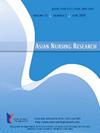Premenstrual Symptoms Risk Factors Among Newly Graduated Nurses in Shift Work: A Prospective Longitudinal Study
IF 2.1
3区 医学
Q2 NURSING
引用次数: 0
Abstract
Purpose
The premenstrual symptoms (PMSs) are a common health issue affecting women of reproductive age and are associated with various physiological, psychological, and situational factors. Newly graduated nurses, when suddenly exposed to excessive workloads and shift work, may experience disturbances such as sleep disorders, fatigue, depression, and stress. These factors are related to PMS, and their occurrence varies. Therefore, this study aimed to understand the changes in PMS and its risk factors among newly graduated nurses across shift work periods, and investigate the longitudinal relationships between PMS and its risk factors based on the theory of unpleasant symptoms.
Methods
This study constituted a secondary data analysis and employed a prospective longitudinal design. Newly graduated nurses were assessed three times: before starting shift work, six months after initiating shift work, and 18 months thereafter. Physiological (age, body mass index, alcohol consumption, dietary behavior), psychological (sleep quality, fatigue, depression, stress, life satisfaction), and situational (social support) factors were included as PMS-related factors.
Results
PMS worsened six months after the initiation of shift work compared with those before, and this aggravation persisted even after 18 months of shift work (p < .001). Age (p = .043), sleep quality (p = .004), and fatigue (p < .001) were associated with PMS. An interaction between time and depression that affected PMS was observed (p = .021).
Conclusion
Newly graduated nurses need to pay attention to the exacerbation of PMS after initiating shift work. Interventions to improve sleep quality and reduce fatigue are crucial for novice nurses, irrespective of shiftwork duration. Additionally, it is important to assess depressive symptoms before starting shift work and implement early interventions. Furthermore, the need for interventions addressing depression escalates with the increase in shiftwork duration.
新毕业轮班护士的经前期症状风险因素:一项前瞻性纵向研究。
目的:经前期症状(PMS)是育龄妇女常见的健康问题,与各种生理、心理和环境因素有关。新毕业的护士在突然面临过重的工作量和轮班工作时,可能会出现睡眠障碍、疲劳、抑郁和压力等不适症状。这些因素与经前综合征有关,其发生率也不尽相同。因此,本研究旨在了解新毕业护士在不同轮班工作期间经前期综合征及其风险因素的变化,并基于不愉快症状理论研究经前期综合征及其风险因素之间的纵向关系:本研究是一项二手数据分析,采用前瞻性纵向设计。对刚毕业的护士进行了三次评估:开始轮班工作前、开始轮班工作后 6 个月、开始轮班工作后 18 个月。生理因素(年龄、体重指数、饮酒量、饮食行为)、心理因素(睡眠质量、疲劳、抑郁、压力、生活满意度)和情境因素(社会支持)均被列为经前综合征的相关因素:结果:与开始轮班工作前相比,经前综合征在开始轮班工作 6 个月后加重,甚至在轮班工作 18 个月后仍持续加重(p < .001)。年龄(p = .043)、睡眠质量(p = .004)和疲劳(p < .001)与经前综合症有关。观察到时间和抑郁之间的交互作用会影响经前综合征(p = .021):结论:新毕业的护士需要注意轮班工作后经前期综合征的加剧。无论轮班工作时间长短,改善睡眠质量和减少疲劳的干预措施对新护士都至关重要。此外,在开始轮班工作前评估抑郁症状并尽早实施干预措施也很重要。此外,随着轮班工作时间的延长,对抑郁症干预措施的需求也会增加。
本文章由计算机程序翻译,如有差异,请以英文原文为准。
求助全文
约1分钟内获得全文
求助全文
来源期刊

Asian Nursing Research
NURSING-
CiteScore
4.20
自引率
4.50%
发文量
32
审稿时长
45 days
期刊介绍:
Asian Nursing Research is the official peer-reviewed research journal of the Korean Society of Nursing Science, and is devoted to publication of a wide range of research that will contribute to the body of nursing science and inform the practice of nursing, nursing education, administration, and history, on health issues relevant to nursing, and on the testing of research findings in practice.
 求助内容:
求助内容: 应助结果提醒方式:
应助结果提醒方式:


